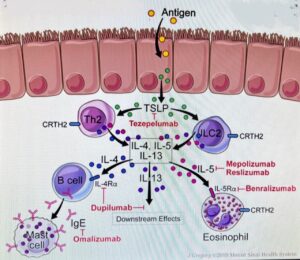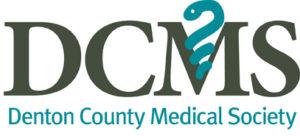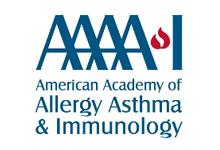Asthma is a common medical condition that affects  about 5-10% of the population or an estimated 23 million persons, including 7 million children. It is a chronic lung condition in which the airways narrow, swell, and produce increased mucus. This can lead to difficulty breathing, wheezing, coughing, and shortness of breath. There is no cure for asthma, but symptoms can be controlled with proper treatment. For some patients, symptoms are mild and controlled with a combination of inhaled corticosteroids and bronchodilators. But for others, symptoms could be more persistent and severe in which combination therapy may not be enough, leading to more frequent asthma flares, ER visits, hospitalizations, and oral or injectable steroid use, which have numerous undesirable long-term side effects. Biologics might be the next step to achieve better asthma control.
about 5-10% of the population or an estimated 23 million persons, including 7 million children. It is a chronic lung condition in which the airways narrow, swell, and produce increased mucus. This can lead to difficulty breathing, wheezing, coughing, and shortness of breath. There is no cure for asthma, but symptoms can be controlled with proper treatment. For some patients, symptoms are mild and controlled with a combination of inhaled corticosteroids and bronchodilators. But for others, symptoms could be more persistent and severe in which combination therapy may not be enough, leading to more frequent asthma flares, ER visits, hospitalizations, and oral or injectable steroid use, which have numerous undesirable long-term side effects. Biologics might be the next step to achieve better asthma control.
What are biologics?
Biologic therapies are products derived from living  organisms and can include vaccines, blood products and genetically engineered proteins. The biologic agents currently approved for the treatment of severe asthma in the United States are all genetically engineered proteins that target parts of the immune system that can cause inflammation in the airways of the lungs, which is characteristic of asthma. These agents are laboratory-produced antibodies, that are called monoclonal antibodies. These antibodies are usually created by injecting a mouse with a human protein that is implicated in disease. The mouse immune system then begins to make antibodies that target the human protein. The mouse antibodies are “humanized” to make them less likely to cause an allergic reaction when given to humans. These humanized antibodies can be mass produced in laboratory cell cultures.
organisms and can include vaccines, blood products and genetically engineered proteins. The biologic agents currently approved for the treatment of severe asthma in the United States are all genetically engineered proteins that target parts of the immune system that can cause inflammation in the airways of the lungs, which is characteristic of asthma. These agents are laboratory-produced antibodies, that are called monoclonal antibodies. These antibodies are usually created by injecting a mouse with a human protein that is implicated in disease. The mouse immune system then begins to make antibodies that target the human protein. The mouse antibodies are “humanized” to make them less likely to cause an allergic reaction when given to humans. These humanized antibodies can be mass produced in laboratory cell cultures.
There are currently 6 FDA approved biologics for patients with severe asthma
Xolair (omalizumab) was approved by the FDA in 2003 for the treatment of children and adults with allergic asthma. It is a monoclonal antibody that specifically targets allergic antibodies (IgE). Xolair works by blocking allergic antibodies and preventing the release of chemicals that can trigger allergic reactions, including asthma attacks. It can be an effective treatment for asthma patients who have allergies to dust mites or other perennial allergens including animals. Asthma patients interested in Xolair need to undergo a simple skin and/or blood allergy test to find out if this is an appropriate treatment option.
Xolair is a subcutaneous injection that can be administered in the office setting or may be prescribed as at-home administration for the appropriate patient. It has also been approved for the treatment of chronic hives and as well as treatment for nasal polyps.
Nucala (mepolizumab) Fasenra (benralizumab), and Cinqair (reslizumab) are three medications approved by the FDA in the last several years for children and adults with eosinophilic asthma. Eosinophils are inflammatory cells that are associated with lung inflammation in asthma. These three drugs either target interleukin 5 (IL-5), which activates eosinophils, or the interleukin 5 receptor (IL-5R). These medications are potential options for patients who have asthma and elevated numbers of eosinophils in their blood. Asthma patients interested in these medications must undergo a simple blood test to find out if they have elevated eosinophils.
Nucala got its FDA approval in 2015 and it is a subcutaneous injection that can be administered at home. Since 2015, it has also been approved for the treatment of eosinophilic granulomatosis with polyangiitis (EGPA), Hypereosinophilic syndrome (HES), and nasal polyps.
Cinqair got its FDA approval in 2016 and it is administered in a healthcare setting as an intravenous infusion.
Fasenra got its FDA approval in 2019 and it is a subcutaneous injection that can be administered at home.
Dupixent (dupilumab) is a monoclonal antibody that targets a receptor for two molecules that drive allergic inflammation. It blocks allergic inflammation. It was first FDA approved for atopic dermatitis (eczema) in 2017, for asthma in 2018, for nasal polyps in 2019, and for eosinophilic esophagitis (EoE) in 2022. It is a subcutaneous injection that can be administered at home.
Tezspire (tezepelumab) is a monoclonal antibody that targets thymic stromal lymphopoietin (TSLP), a protein involved in immune and allergic responses that cause airway inflammation. It blocks allergic inflammation. It was FDA approved in 2021. It is a subcutaneous injection administered in the office setting.
Many of these biologics are approved for both children and adults. Depending on the therapy chosen and the individual patient’s test results, frequency of treatment can be every two weeks to once every two months.
What’s the next step?
If you or a family member have asthma and would like to find out more about these treatment options, our board-certified allergists at North Texas Allergy and Asthma Center can help! Do not hesitate to contact us.
SHIKHA MANE, MD
Board Certified Allergist







